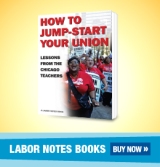 In mid-January, the International Association of Machinists (IAM) announced a new initiative—a union for the unemployed. Below is an excerpt of the press release I was forwarded:
In mid-January, the International Association of Machinists (IAM) announced a new initiative—a union for the unemployed. Below is an excerpt of the press release I was forwarded:
Friday, January 15, 2010, marks the start of a movement.
The International Association of Machinists and Aerospace Workers will launch Ur Union of Unemployed — or UCubed as we’ve nicknamed it — an online community that aims to unify the unemployed in a unique and useful way.
Ur Union of Unemployed will organize the unemployed into community activist groups known as cubes.They will have at their fingertips a number of employment resources. And, together they will turn up the heat on politicians from the State House to the White House to act swiftly to address this current jobs crisis.
See, there’s strength in numbers. And 31 million unemployed Americans is a pretty big number. Each cube will be organized by zip code. Six activists combine to make a cube. Nine cubes create a neighborhood. Three neighborhoods create a block. Multiply that again and again, and you’ve got a powerful community that can effect real change — one that politicians can’t ignore.
On January 15, 2010, visit UCubed at www.unionofunemployed.com and watch as the nation’s unemployed take back control.
Unlike their European counterparts, most organized American workers lose their union memberships if they lose their jobs. When a worker needs the less material benefits of unionism most—community, solidarity—they are suddenly no longer part of the movement. According to Frank Larkin, Communications Representative for the Machinists, that is exactly what this UCubed idea is supposed to do, in part. Yessir, organizing the jobless is a great idea. But this sounds like a union for the unemployed that basically functions as Facebook for the economically distressed.
I’ve done some reporting on these issues for other publications and I have a number of sources and friends involved in organizing the unemployed and the labor movement writ large. I’ve spoken with them about the value of Internet mobilization, specifically in regards to the jobless, and generally they are unconvinced. Working America’s “Unemployment Lifeline” project is often cited in this regard, another Internet-based project meant to marshal the victims of the Great Recession. It has achieved very little in practical terms.
There are two general problems with organizing the downtrodden online. People in crisis need to know that a tangible someone is there for them, a fellow being who will listen to their private fears, bring them a steaming pan of lasagna, buy them a beer or three at the bar, etc. It’s very hard to do that virtually. (Also, when a person has just been laid off real human contact is a much better salve than spending a bunch of time the computer. That way lies online gambling and porn addiction.) The other issue is Internet access, which gets harder to maintain when you don’t have a workplace connection or a regular paycheck.
Statements from IAM’s President Tom Buffenbarger make it sound as though they are banking on the unemployed organizing themselves: “We hope that UCubed will provide a measure of relief and an end to the isolation, frustration and depression that so many unemployed workers experience,” Buffenbarger said. “Working together, they can build a network of mutual support and help each other to get through the next few years.” Missing is any idea of how he will get that ball rolling. To make this work the Machinists would need to get boots on the ground, real people with a strong pitch bringing this to the people, introducing the idea at worker’s centers, union halls, unemployment offices and the like.
To be fair, the Machinists seem to be aware of their project’s limitations.
“This has more in common with the type of bonds that are created on social networking websites,” Larkin said in a phone interview. “That’s more the goal than creating a type of local labor structure. I agree perfectly that face-to-face is absolutely critical and there is no substitute for it.”
Agreed. I’ll wait and see how it develops, but for now, I’m skeptical.
Jake Blumgart has been a staff writer for Campus Progress. He is a writer and blogger for Seattle’s alternative weekly The Stranger, where this article originally appeared. It is published here with the permssion of the author.
Filed under: Organizing | Tagged: International Association of Machinists and Aerospace Workers, U Cubed, UCubed, Ur Union of Unemployed |



![Reblog this post [with Zemanta]](https://i0.wp.com/img.zemanta.com/reblog_e.png)


Hi — links are malformed, but thanks for the information.